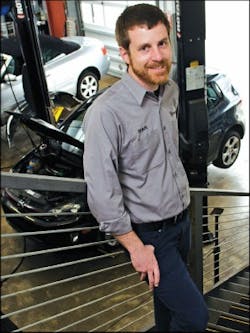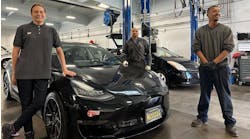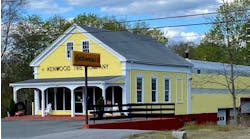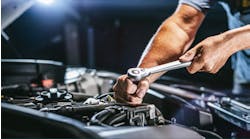As Ryan Clo carved his 2001 Volkswagen Jetta TDI through the foothills of the Rocky Mountains just west of Denver, he heard a noise he recognized all too well.
Fifth gear went out.
On his way out West for a much-needed vacation, a long stretch of highway now stood between Clo and his Cincinnati-based Audi-Volkswagen specialty shop, Dubwerx LLC. He was roughly 1,200 miles from home, from his business, and from all the problems that awaited him on arrival.
After 13 on-and-off years of running his own repair facility, business had never been better—or more frustrating.
“We had reached a point where we had to expand onto the building, add a tech, some lifts,” Clo says. “We were overloaded with work and turning people away, or giving back cars having done just the bare minimum.”
And with the addition of extra space, staff and car count, came a quick realization that he wasn’t prepared or organized to handle it all effectively. Operations were amiss; it was chaotic, Clo says.
Luckily for him, road trips are every bit as good for introspection as they are bad for mechanical failures.
He limped his car back down to Denver, pulling into Avalon Motorsports for the repair. And after seeing that facility, Clo realized exactly what he needed to change about his business: everything.
The Backstory
Always do what you love—that piece of advice, bestowed upon him by his dad when he was in high school, still carries over into everything Clo does today.
“I’ve loved those cars since I had my first Jetta in high school,” says Clo, 35, who began his mechanical “education” working on his fist car, a Volkswagen Jetta, in his parents’ garage. “When it came to going into business, I’ve always felt specializing was the way to go. There are too many vehicles out there to be great at everything. If you can find a need and hone in on that, you’re going to be much better off.”
And that’s what Clo did, working exclusively on Volkswagens, and then Audis, out of a two-bay shop in 1998. It was “a pretty informal business,” Clo says, as it was just him and a handful of customers. He set his own prices and hours, which were often sporadic, but he quickly built a sturdy reputation for quality work.
After several switches from small facility to small facility—and a brief stint working in real estate—Clo came to his current location in east Cincinnati, determined to turn Dubwerx into a viable, more professional business.
He hired a tech, put his head down and plowed through the work.
Quickly, the shop went from $100,000 a year in revenue to $200,000, then $300,000, then up to $500,000 by 2010.
Then came the building expansion, the additional technician, and a whole new set of problems.
The Problem
Clo wanted to find a way to make his shop, in every aspect, match up the ideal he held in his head. He wanted to be a true dealer alternative, a shop that sent a firm rebuttal to the long-standing stereotypes of grease monkey shops.
What he saw every day certainly didn’t match that vision.
The shop continued work through the building renovations, but even with the extra hand in the shop and the extra space for vehicles, Clo could tell there was still more missing in his overall plan.
The shop fell behind in work orders, causing Clo to offer customers a hurried, quick-in, quick-out service that didn’t allow for thorough inspections or for his staff to perform more than bare minimum work.
Meanwhile, the shop was unorganized. Work orders were still written by hand with no effective way of distributing them to staff. They didn’t have anyone full-time at the front counter. Calls were going unanswered. Customers would get confused, especially since the shop didn’t seem to have strict hours, opening at different times almost daily.
And the waiting room, still under renovation, revealed just how much of a work-in-progress Dubwerx truly was.
“I’d always admired Steve Jobs a lot and the idea that he built a company that offers customers an overall experience,” Clo says. “It wasn’t just about the product, the branding. It wasn’t just the customer service or the stores. It was everything. That’s what I wanted, I just wasn’t sure how to get there.”
The Options
With the renovations getting closer and closer to being completed, Clo knew he would have a good enough facility to demonstrate a high level of professionalism to his customers, a high-end-vehicle-owning group used to plush, cushy dealership service.
Still, his shop’s operations couldn’t match that, not with the overloaded and hectic operations that stood behind the soon-to-be improved façade.
Clo saw two options: He could stick to his current set up and simply start turning away more customers, focusing more thoroughly on a smaller car count; or he could overhaul his entire organization and make major changes in day-to-day operations.
It took his own vehicle breaking down to realize what he needed to do.
The Decision
Avalon Motorsports is what many industry experts consider to be one of the best shops in the country. The polished and pristine facility boasts strong technical expertise and top-tier customer service.
“They’ve got the whole package there,” Clo says. “I was in there, talking with [owner] Brian [Sump] and his staff and looking at the way he did things, and I really saw that you could be this nice, impressive, independent facility without the stuck-up feel to it.”
The shop had a comfortable, welcoming atmosphere, Clo says, one not usually found in true “high-end” facilities.
So, what allowed Avalon to keep its down-to-earth, customer-above-all-else mentality while offering an elegant feel that few dealerships can match? Just one thing: organization.
Sump gave Clo a quick tour of how day-to-day operations were run at Avalon—the amount of systems and processes that went into even the smallest of tasks, like booking an appointment or answering the phone. And Clo saw how everything was run through the shop’s computer-based management system.
“It’s not like I wanted to re-make Brian’s shop,” Clo says. “But I saw what you could do with that level of organization, with having everything set in standard procedures and systems. That’s what I took back with me: If you have those organized operations, you can really make your shop what you want it to be.”
His vehicle fixed, Clo drove back to Cincinnati determined to turn things around. And with help from a consultant, he started organizing his business.
The Aftermath
It was a laundry list of changes, Clo says, starting with researching and purchasing a shop management system (he went with one from Protractor), which led to religiously tracking his numbers and the realization that his parts markups were too low. He raised those, set firm hours of operations and began creating standard operating procedures for the daily tasks of his shop. He also hired a full-time front desk employee (he has since hired another), dedicated to customer service.
Meanwhile, the facility changes wrapped up with a finished product that, with its contrast of comfy waiting-area seating and modern concrete countertops, gave the feel Clo wanted: professional, yet laid-back and functional.
And the results started to show—quickly.
Clo is quick to point out his lack of business expertise and experience—not as an excuse for mistakes, but as proof of how understanding “simple concepts and ideas” can make all the difference in a shop.
The Takeaway
He says he now likes to look at his shop in three distinct segments: the shop, his employees and his customers. All three have to benefit from what the shop does.
“It’s like the idea of Jobs and Apple,” Clo says. “You have to have that company culture, all those things in place, to be able to offer the whole experience. We had to really find who we were and what we wanted to be, and then it’s a process of figuring out how everything aligns with that.
“I always had that end idea of what I wanted our shop to be, but you need to have all the things in place to get you there.”



